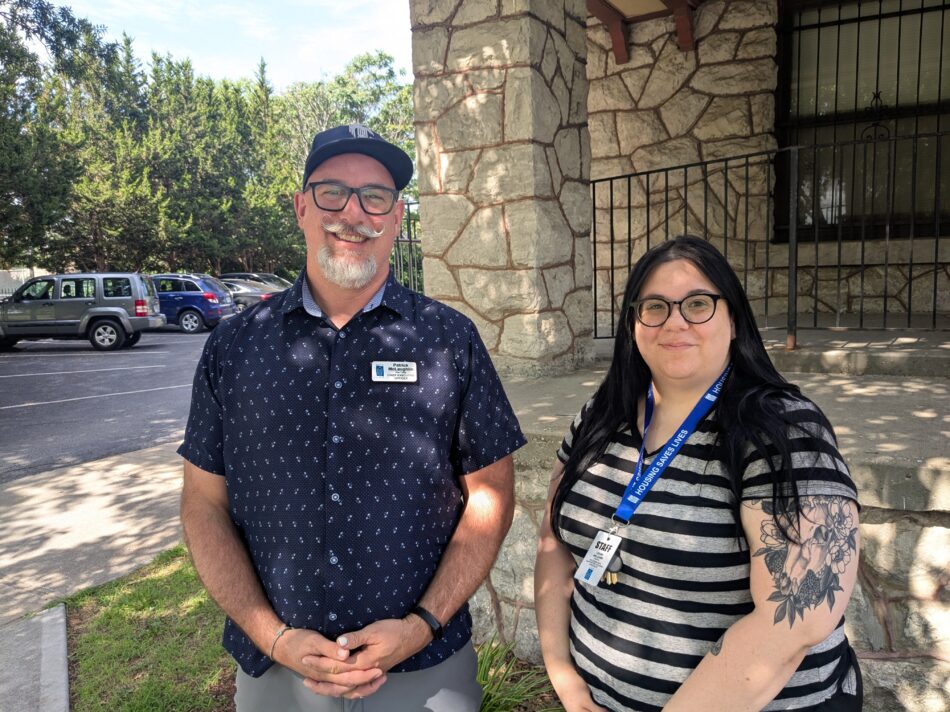
Kansas City, like most cities in the U.S., is in the middle of an affordable housing crisis. At Harvesters, we are focused on tackling food insecurity, but hunger never occurs in a vacuum, and before a person can have stability in their life, they need a place to live.
SAVE, Inc., one of our Agency Partners, was founded during the height of the HIV/AIDS epidemic as a hospice center. Since then, it has grown into a multifaceted agency that provides housing and wraparound services to individuals and families who are vulnerable to housing discrimination. This includes people living with HIV, people who have severe mental illnesses, and people with ongoing substance abuse disorders.
“Discrimination is a really big piece for us,” explained Patrick McLaughlin, SAVE Inc.’s CEO. “People who are medically and socially vulnerable face a higher rate of housing insecurity. Our work is rooted in that reality.”
One of SAVE’s most impactful programs is its shelter specifically geared toward LGBTQ+ young adults. This shelter provides a safe, affirming space for youth aged 18–24 who may have nowhere else to go. Many of these individuals are often rejected from traditional men’s or women’s shelters due to their gender identity or sexual orientation.
“We’re trying to get the most vulnerable people off the street as quickly as possible to save their life,” Patrick says. “Literally, if we don’t house them, they’ll die.”
Harvesters partners with SAVE Inc. To stock the on-site food pantry at the shelter. Their team also refers their clients to our wide network of pantries so that they can get the food assistance that they may require.
At the heart of SAVE Inc.’s approach is the Housing First model—a widely recognized strategy that prioritizes stable housing as the foundation for all other forms of recovery and rehabilitation.
Housing First means SAVE Inc. doesn’t ask people to “fix” themselves before receiving help. Instead, they are accepted as they are. Once someone has a place to live, the SAVE team works to connect them to food assistance, healthcare, employment support and anything else they might need to regain control of their life.
SAVE Inc. owns or operates more than 100 units of permanent supportive housing. These properties are designated for individuals who have qualifying diagnoses. Residents of these units receive ongoing case management and housing support, with no time limit on their stay.
SAVE Inc. also administers over 1,000 federal housing vouchers in the Kansas City area. These vouchers allow people to find their own housing in the community while receiving financial assistance to pay rent. While some vouchers come with case management support, others are more self-directed, requiring clients to maintain their housing on their own.
In addition to providing food at the shelter, SAVE Inc. teaches cooking skills to the residents. For these youth, cooking lessons using donated food turn mealtime into a training moment.
“Many of our residents think food comes from a can, and they don’t know how it got there,” Patrick says. “So when they’re treated with fresh food that came out of the ground, they don’t know what to do with it. Our staff helps give them opportunities to see how to prepare potatoes, how to prepare meat, how to prepare vegetables that are fresh.”
Beyond basic shelter, SAVE’s youth programs aim to empower. The All Haven property, a partnership with the Vecino Group, includes 50 low-income units—12 of which are set aside for transition-aged youth. Residents get optional case management to help them build skills in budgeting, cooking, and independent living.
“These are often young people who aged out of foster care or fled unsafe homes,” says Leann. “Our goal is to give them a safe place to start adulthood.”
One of the biggest barriers SAVE Inc.’s clients face isn’t economic. It’s social stigma.
“We lack a lot of understanding as a society about the social emotional needs of folks that have mental illness and other even physical disabilities,” Leann says. “They just want to participate, and want to give back. In the years I’ve been in this field, I’m impressed by the generosity of the people that we serve, who want to pay us back, who want to give back in some form or fashion because they have value, and they want to express that.”
“Tragedy just happens sometimes,” she continues. “It can happen overnight. It can happen over an extended period of time. But that doesn’t change the fact that the person going through that is a human being. Everyone deserves that humanity and that dignity.”
